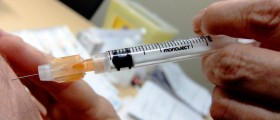
Before Gardasil was licensed (for women and girls aged nine to 26 in 2006, and for men the same ages too in 2009), clinical trials were conducted to measure the vaccine's effectiveness and its safety. More than 29,000 people of both sexes participated in these trials, and the vaccine was deemed safe for use. VAERS, the Vaccine Adverse Events Reporting System, received 19,075 reports about Gardasil since the vaccine was licensed, most of which come from women.
Those writing about the reports that VAERS received, like the Centers for Diseases Control and Prevention (CDC) are always quick to point out that the reports the system gets are about adverse effects following vaccination, but that the bad outcome is not necessarily directly linked to receiving the vaccine. According to the VAERS database, 92 percent of the reported adverse effects of Gardasil were non-serious meaning there was no death, hospitalization, or long-term disabilities or other permanent consequences. The other eight percent were more serious, and it only takes a quick Google search on Gardasil deaths to realize that the HPV vaccine can, indeed, have the most serious side effect of them all.
VAERS too says that there were 71 reported cases of death following vaccination with Gardasil. Of those, 34 have been verified by medical investigations. Should these deaths factor into your decision to get the Gardasil vaccine for yourself or your children? Perhaps only you can make that decision. We will point out that HPV and cervical cancer can lead to death too, and that around a third of those diagnosed with cervical cancer will die as a result of it. At the same time, applying caution when it comes to relatively new vaccines, about which not all the relevant information is available yet, seems wise.




_f_280x120.jpg)












Your thoughts on this
Loading...